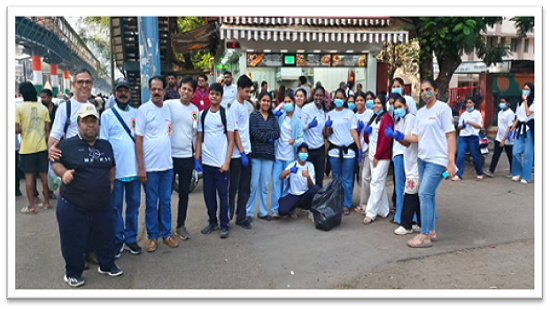
Mumbai’s Mega Clean-Up Push Transforms Borivali, 600+ Citizens Unite in Powerful Civic Movement
Mumbai witnessed an inspiring display of community participation as more than 600 citizens gathered outside Borivali railway station for a large-scale clean-up drive on Sunday. What began as a local initiative quickly evolved into a powerful civic movement, bringing together residents, youth groups, professionals, students and NGOs in a coordinated effort to improve one of the city’s busiest public spaces.
The event, supported by the Brihanmumbai Municipal Corporation (BMC), reflected a growing urban consciousness in Mumbai where citizens are increasingly stepping forward to co-create cleaner, healthier and more livable neighbourhoods. With mounting pressure on public infrastructure and rising daily footfall in transport hubs like Borivali station, such collective interventions signal an important shift in how Mumbai approaches public cleanliness and community-driven reform.
A Two-Hour Clean-Up That Became a Catalyst for Civic Action
Held from 8 am to 10 am, the drive saw volunteers equipped with gloves, garbage bags and placards clearing a large stretch outside Borivali railway station. For many participants, it was more than a routine cleanliness activity. It was a reminder of the role that ordinary citizens play in shaping Mumbai’s urban environment.
The programme was organized in partnership with several key organizations, including Rotary Club Borivali, Borivali Advocates Bar Association, Mumbai March, Bharat Desh Pratham, Tulu Sangha Borivali and its youth wing, Yuva Tulu, alongside multiple community groups. Collaboration at this scale illustrates how civic responsibility is now becoming a shared mission across diverse social and professional backgrounds.
Following the clean-up, volunteers were offered refreshments, acknowledging the effort and energy they invested in improving a high-traffic public corridor.
A Ceremonial Start and a Strong Civic Message
The event commenced with a formal flag-off by Harish Maindan, president of Tulu Sangha Borivali, and Praful Tambe, assistant commissioner of the BMC’s R Central Ward, along with other dignitaries. Their presence underscored the importance of institutional and community partnership in city-level sanitation initiatives.
Maindan emphasized the need for collective responsibility in urban maintenance, stating that every citizen has a role in building a vibrant city and a cleaner nation. His remarks echoed a broader sentiment gaining ground across metropolitan India, where civic pride is increasingly linked with environmental stewardship.
He also expressed gratitude to the BMC for its operational support, particularly recognizing the contributions of assistant engineer Sandeep Mhalunkar and participating NGOs. His message highlighted a simple but powerful idea: urban cleanliness is not a one-time task but an ongoing commitment shared between institutions and the public.
A Call for Sustained Urban Participation
Speaking at the event, assistant commissioner Tambe reinforced the need for consistent clean-up efforts, noting that safeguarding the environment is part of preserving the future for upcoming generations. His comments resonated in a city where waste management challenges continue to grow alongside population density.
Tambe emphasized that the municipal corporation deeply values citizen-driven initiatives, especially those that succeed in creating visible behavioural change and awareness among the general public. He encouraged more frequent and decentralized clean-up efforts, stressing that the long-term health of Mumbai depends heavily on community involvement.
Strong Participation from Civic Leaders, Institutions and Youth
A notable feature of the Borivali clean-up was the diversity of participants. Attendees included civic leaders, professionals, corporate representatives, athletes, students and NGOs, demonstrating a cross-sectional commitment to environmental well-being.
Among the dignitaries present were:
• Avinash Thawani of Mark 10
• Vijaya Babariya of Smartads
• Dilip Patel of Bharat Desh Pratham
• Kamlesh Pipaliya of Rotary Club
• Coach and athlete Melwyn Crasto
• K M Giri, president of Borivali Advocates Bar Association
• Representatives of Union Bank of India
A significant student contingent from Mary Immaculate Junior College, St Francis Institute of Research and Management, St Francis Junior College and BMC Kannada Medium School added momentum to the campaign. Women’s groups, including Sahayog Mahila Mandal, and runners from the Sanjay Gandhi National Park (SGNP) community also participated, demonstrating how clean-up drives can mobilize varied sections of society around a single cause.
Participants were presented with commemorative mementos, including T-shirts, recognizing their contribution to the initiative.
A Micro-Movement with Macro Impact for Mumbai’s Urban Health
Clean-up drives of this scale go beyond beautification. They offer long-term benefits to the city’s civic health, reduce litter accumulation in crowded zones and spark conversations about responsible waste disposal. In high-density hubs like Borivali station, where thousands of commuters pass through daily, even a single morning of organized cleaning can dramatically alter public perception about shared civic spaces.
More importantly, such drives demonstrate the multiplier effect of coordinated community action. When citizens witness visible impact created by collective effort, it encourages wider participation, leading to cleaner surroundings and greater accountability, both individual and institutional.
The Road Ahead, Toward a Cleaner and More Connected Mumbai
While the Borivali clean-up was an uplifting display of civic engagement, sustaining the momentum will be crucial. Mumbai’s waste management ecosystem requires regular collaboration between municipal bodies, civil society and local communities. By focusing on public awareness, recurring clean-ups, and behaviour change at the ground level, the city can move closer to a long-term culture of responsibility and cleanliness.
The Borivali initiative represents an important milestone, proving that when citizens unite with purpose, even a two-hour activity can create meaningful change. As Mumbai continues to expand and evolve, such efforts reinforce the belief that urban transformation does not rest solely with governments. True progress emerges when citizens and institutions work together to create cleaner, healthier and more dignified public spaces.
This clean-up drive, fuelled by community spirit and civic pride, stands as a model for the kind of participatory action that can help Mumbai build a more sustainable and people-centered urban future.





